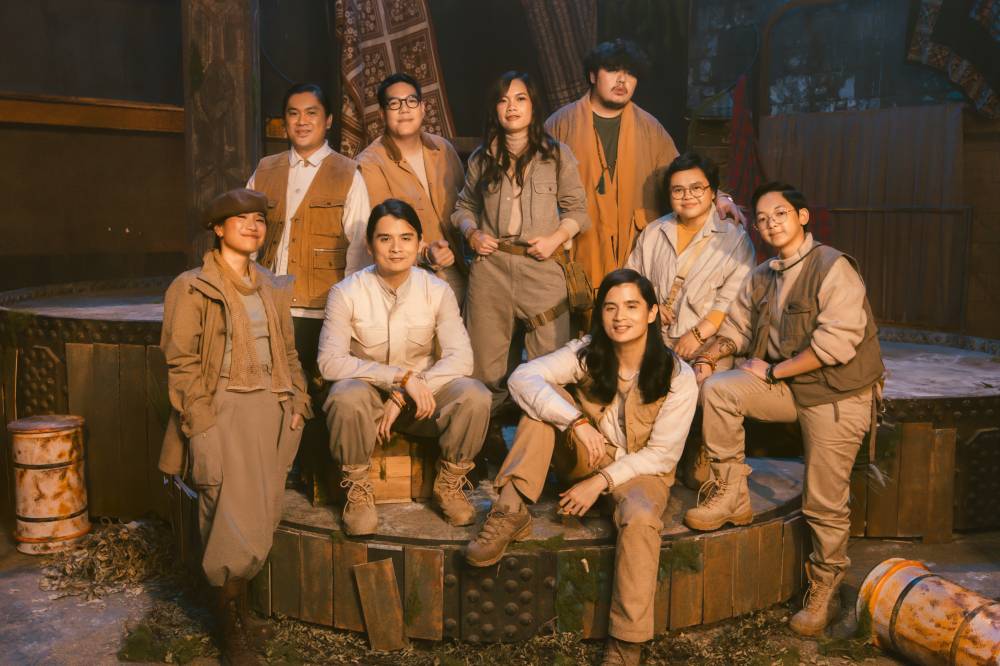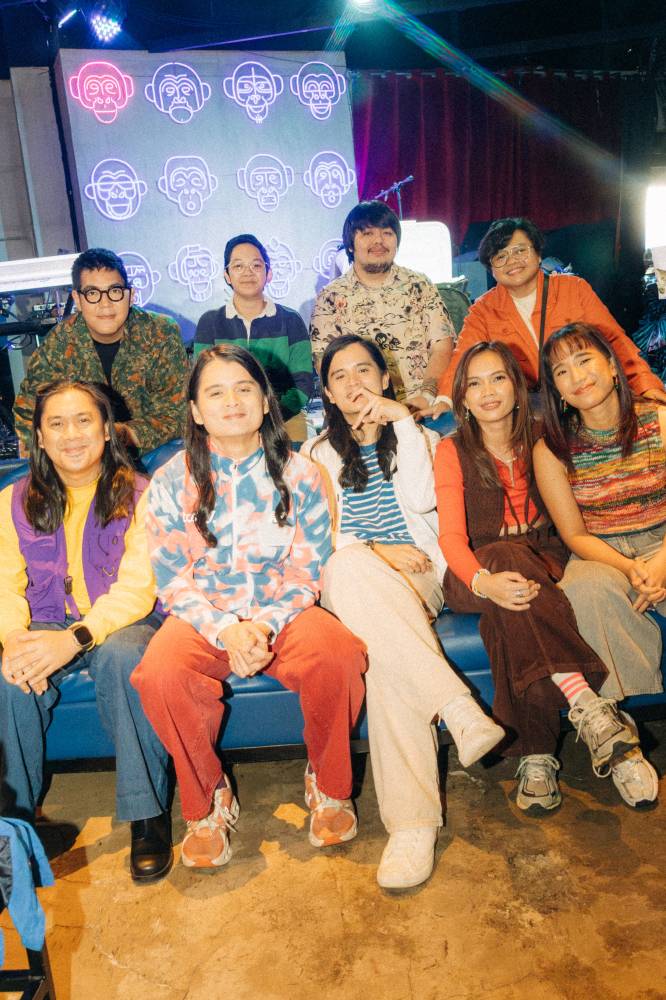Ben&Ben: Embracing human flaws is to rebel against AI

In an ideal world, Ben&Ben’s Andrew de Pano said that artificial intelligence (AI) would remain a tool. “Something to assist and support human creativity.” Or perhaps, in the future, would “help me wash the dishes and clean the house,” he jokes.
But as it is, AI has started to encroach on creative spaces, especially in music. Programs like Suno and Udio can now churn out fully realized songs with mere prompts. And many of these tracks have already made their way onto streaming platforms—sometimes without disclosing their real origins. Even more concerning, some of these were “recorded” (if you can even call it that) and released under names of AI-generated acts.
Recently, the alternative rock band Velvet Sundown made headlines after it was revealed that it was a product of AI—a synthetic act with no human members, whose music, persona, and social media presence were all made up. This came after the group had already released three albums and amassed millions of streams. Needless to say, the revelation sparked discussions about the ethical implications of AI in music.
The line between AI support and simulation is already thin enough—and displacement may be looming dangerously close. For Ben&Ben, this is where things start to get “iffy,” if not, downright “worrying.” The fact that AI systems profit off real artists—usually by way of training datasets built on human work—opens yet another can of worms around copyright and monetization.
Call for regulations on AI
While he admits to not knowing the full spectrum of AI’s creation processes, lead vocalist and guitarist Paolo Guico knows well enough that the technology depends on analyzing the work of thousands of human artists. And there must be a way, he said, to give justice to the creators whose songs have become fodder for AI.
“You can’t say the process is okay if it involves profiting off the work of other people,” Paolo Guico tells Lifestyle Inquirer in an interview—alongside fellow frontman-guitarist Miguel Guico and percussionist Andrew De Pano. “There has to be a balance: artists using AI responsibly and stricter policies when it comes to intellectual property.”
“It’s also about artists standing up for what’s right,” he adds.
In the Philippines, AI regulation is still in its infancy. While there are currently no specific laws addressing its use in music production, the government and various stakeholders have acknowledged AI’s growing impact on creative sectors. The Intellectual Property Office of the Philippines has even stated that it would not grant copyright to works created entirely by AI, and has recently announced plans to issue guidelines on the matter.

Meanwhile, House Bill No. 7396, or the Artificial Intelligence Development and Regulation Act, proposes the creation of a body that would implement a comprehensive national AI strategy—covering areas such as research, cybersecurity, and ethical oversight.
Elsewhere, platforms like YouTube have started to take action. This July, the industry giant said it’s preparing to update its policies so that repetitive, fully automated, and mass-produced videos—also known as “AI slop” —wouldn’t be eligible for monetization.
“It’s a great challenge not only in music, but for other institutions as well,” Miguel says.
Slippery slope
But more than money, authorship, or other ethical concerns, the rise of the AI industry raises urgent questions about the very essence of music: creativity, emotion, authenticity—and their potential erosion.
For Miguel, people must first possess foundational skills for a given task or craft, before turning to AI for assistance. But it’s a slippery slope. If AI can help streamline your work in seconds, then what’s stopping you from asking it to do the entire work for you?
He cites the reliance on the generative AI chatbot ChatGPT for essay writing to illustrate his point: “We should know how to write essays ourselves before turning to AI, because we risk forgetting those skills. It’s the same with music-making. AI can expand on ideas you can think of, but it’s dangerous to become overly reliant on it.”
“Otherwise, there will be regression,” he stresses, “because AI replaces your thinking process.”
If young aspiring musicians see songs being created in seconds by those with no real passion or dedication to the craft—and still able to make a living out of it—it can be disheartening. Unfortunately, this is a sentiment De Pano has been hearing more and more.
“There are new artists now wondering what’s the point of it all? What’s the point of learning and nurturing the hobbies they love when hard work is just a prompt away,” he laments.
“What I worry about, and what I wish I could tell those new artists, is not to get discouraged. Keep creating because there’s definitely space for you—your creativity and your unique perspective—in whatever branch or field you choose to pursue,” De Pano adds.
What AI can’t replicate
But the reality is, AI is here to stay, and there’s no stopping it at this point. People must learn to coexist with it. And instead of trying to compete with AI or match its speed and technical precision, perhaps the better step is to acknowledge the flaws that make us—and our music—ultimately human.
After all, stacking against a system programmed for perfection and embracing our imperfections is to rebel against AI.
“We can do something,” Miguel declares. “We can rebel against it. And what I mean by that is for artists to challenge themselves—to find out what’s wrong or imperfect in what you do. AI is trained to find the perfect solution to everything. But human behaviors are not perfect. We’re not perfect.”
It can be in the little cracks in the voice, a word out of place in the lyrics, or a strum that misses the beat. After all, it’s the emotions, the vacillating mental state, or simply being present in the moment that trigger those imperfections in the first place.
It can also boil down to physiology. You sound how you sound because that’s who you are, and you write what you write because that’s what makes you who you are.
“Your vocal tone might have a bit of sibilance that some people find harsh to the ears, but that’s what makes you different,” Miguel says. “I know it might sound vague…and sure, AI might one day be trained to replicate imperfection. But still, imperfection is something we can own.”
And if there’s one thing AI can’t replicate, Paolo says, it’s the experiences that shape their music and the real-world connection they’re able to build because of it. “We also focus on making memories with our fans, with everyone. That takes time and commitment…[and] presence.”
For a band that made a name for itself for its storytelling and organic folk-pop sensibilities, asking its members whether they use AI or if it has a place in their creative process almost feels like an insult to their artistry and values. Not to dismiss those who do, but the idea De Pano says, is “simply something unthinkable.”
“I don’t think we’ll be happy [with] taking out the human heart aspect out from the things we do, okay. For us, that’s never going to fly. As long as we’re alive, we’re here. And we will work as we’ve always done.”
Besides, what good is having nine members if they can’t create and think for themselves? “Siyam na nga kami,” De Pano says, laughing. “Nakakahiya if we still involve an AI!”





















